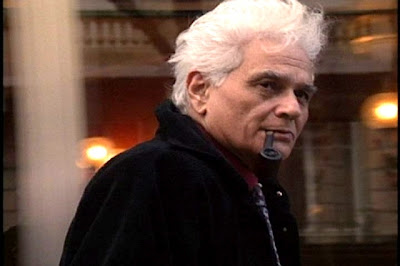Derrida
 When the French philosopher Jacques Derrida died in October of 2004, I had intended to write something about it on my blog. Unfortunately I never got around to it.
When the French philosopher Jacques Derrida died in October of 2004, I had intended to write something about it on my blog. Unfortunately I never got around to it.I was reading an interview with Gayatri Spivak the other day and I was reminded about how I hadn't written anything about Derrida yet. Like most people I have had a back and forth, regularly conflicted relationship with the work of Derrida. When I first read Of Grammatology many years ago, my first reaction was "bulls*it!" From the perspective of someone who is from a "non-modern" culture, the idea that Derrida proposed that in European philosophy "speech" is privileged over "writing" was not just wrong, it was insulting! The reason that a text like Destiny's Landfall which is extremely comprehensive, bringing together most all acknowledged sources on Guam's history can nonethless be problematic and often written atop racist assumptions, is simply because for the writing of indigenous people's histories outsiders, written sources are privileged well and above spoken sources.
When I returned to Derrida years later, I realized that I had actually (like most people) misread his argument. Deconstruction was not about arguing that writing is better than speech, or even vice versa, but only that the elevating of one over the other, because of its obvious or natural closeness or essential proximity is never certain or closed, but always remains open for reversal, contestation and critique.
Speech, in the theories of philosophers such as Plato is privileged as being infused with a higher order of truth, a more fuller presence/essence of being. If we think of what is to be written or communicated as originating in the mind, then speech is one act removed from the true intent or essence of what was to be said, whereas writing exists as a mere copy, a fake, corrupted form. Twice removed from the source of meaning, and a mere duplicate or copy of speech.
Derrida's point isn't simply that writing is better than speech, or that speech is better than writing, although this reversal and flipping of binaries is part of the deconstructive process. What Derrida's point here is that writing and speech, regardless of where we see them in relation to the origins of thought, meaning or truth, or what hierarchies we create to make one seem better than the other, they both follow the same rules of meaning possible only through a system of differences, which means they are both always open for contestation and plagued with indeterminancy and victim of a distance to "truth" and "essence" which can never be overcome.
If the paragraph above made no sense, then you might agree with the tone of this interesting obituary of Derrida from The New York Times, which sounds like an undergrad frustrated at the uselessness of Derrida's text. For those searching for a "traditional" form of clarity, Derrida is not your best friend. To those who seek to know which is closer to the "truth of things" speech or writing, Derrida will only confuse you, by reminding you that such a quest, while possibly inevitable and necessary, will always end in failure.
Before going I just wanted to note that one of the easiest ways for getting into the life, theories and impacts of Derrida, is the documentary film that came out several years ago. It has some nice interviews with him, as well as people in his life, and excerpts from his texts. I just thought I'd share in his honor, one of the more cute and funny moments from the film:
************
Guaha un “na’chalek” na scene gi i kachido put Derrida, na’ån-ña Derrida.
I film crew ma dalalaki Si Derrida påppa’ para i fanleployan gi i gima’-ña. Anai manhuyong siha ginnen i gua’ot, ma fa’nu’i hit i mineggai na lepblo-ña Si Derrida. Gi minagahet nina’manman yu’ nu ayu siha, sa’ kulang manmasohmok este na kuato ni’ lepblo siha.
Ginnen i ineppen i crew, annok lokkue na manhinegef.
I bulaka (palao’an na balaku) ha faisen Si Derrida, “Kao un taitai todu este siha na lepblo?”
Chumiche’ didide’ Si Derrida annai ha oppe, “Ahe’, buente kuatro pat singko ha’.”
Todu mañalek, sa’ dipotsi na este na taotao, gof malåte yan fåyi (pues pon po’lo siempre na i tinaitai-ña siha ti tifung’on)
Lao ti munhayån i essitan-ña Si Derrida. Annai hokkok i chinatge siha, ilek-ña, “Lao ayu na kuatro, hu gof’f’f taitai.”
I film crew ma dalalaki Si Derrida påppa’ para i fanleployan gi i gima’-ña. Anai manhuyong siha ginnen i gua’ot, ma fa’nu’i hit i mineggai na lepblo-ña Si Derrida. Gi minagahet nina’manman yu’ nu ayu siha, sa’ kulang manmasohmok este na kuato ni’ lepblo siha.
Ginnen i ineppen i crew, annok lokkue na manhinegef.
I bulaka (palao’an na balaku) ha faisen Si Derrida, “Kao un taitai todu este siha na lepblo?”
Chumiche’ didide’ Si Derrida annai ha oppe, “Ahe’, buente kuatro pat singko ha’.”
Todu mañalek, sa’ dipotsi na este na taotao, gof malåte yan fåyi (pues pon po’lo siempre na i tinaitai-ña siha ti tifung’on)
Lao ti munhayån i essitan-ña Si Derrida. Annai hokkok i chinatge siha, ilek-ña, “Lao ayu na kuatro, hu gof’f’f taitai.”




Comments